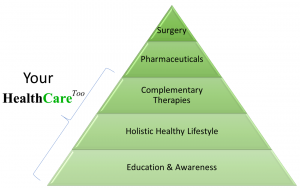Health Professionals Embracing Complementary Medicine

This is a key distinction between our current conventional “sick care” disease management system which seeks to “fix” a disease with a targeted drug therapy or clinical procedure(s) and a “healthcare” approach that puts the person (not the disease) at the center.
While many western-trained doctors and pharmacists continue to reject all alternative medical treatments, others are embracing a complementary approach, or even integrating their conventional training with other medical traditions.
Niamh Boden was not exposed to herbal medicine while growing up, but was fascinated by the science of how drugs work in the body and so chose to study pharmacy. “We did do a section in our course in Queen’s on pharmacognosy, which is the science of plants, and I found that very interesting,” she recalls.
Boden worked as a hospital pharmacist before moving into retail and finally establishing her own business, Dunville Pharmacy in Dublin’s Ranelagh. Five years ago, she decided to enrol at the College of Naturopathic Medicine to study herbal medicine and naturopathy, believing that expanding into herbal medicines could help the business stand out from other pharmacies.
What she didn’t expect was how much the course would change her own lifestyle. “I saw this other side to healthcare which was about looking at your health and your well-being. It wasn’t about taking this herb to fix A or this herb to fix B, it was about finding balance in your life,” she says.
“It was really helpful for my own health and my family’s. When I started the course I would have got quite sick through the winter. I would have been on antibiotics, had chest infections, been very run down, feeling exhausted all the time. I realised I needed to take more time out for myself, to stop working 50 hours a week, to cook wholesome meals with good ingredients, and I started using the herbs. That first year, I had a really bad cough and my teacher gave me a mixture with myrrh in it and a few lung tonics, and literally within three days I was completely better. I was amazed and surprised at how well it worked. From that day on I haven’t touched an antibiotic.”
For more information please see the original article: The health professionals embracing complementary medicine
Our Model




